Posted: January 8th, 2010 | Author: Finn | Filed under: Features | Tags: Adam X, Interview, Playing Favourites, Resident Advisor | No Comments »

> Strafe – Set It Off
Ok, let’s start it off with “Set It Off”.
Right, we’re going to set it off with “Set It Off”. Basically with “Set It Off”, growing up in New York in the 70’s and 80’s, I grew up with my parents and my brother – my brother being a DJ since 1980, and there were a lot of musical roots in my household. I was always around music. Mostly disco and electro, stuff like that. Growing up with my parents in the 70’s, they were really big on disco and I was hearing everything from “Ten Percent” by Double Exposure to so many underground disco records, like from 76, Jimmy and the Vagabonds, or Crown Heights Affair. Old school disco. I always had roots in the family. My father also had a pretty big rock collection from the late 60’s – Sabbath, Zeppelin, psychedelic rock. That was played probably when I was really younger, but 74/75 my parents were already getting into disco at that time. The roots of the music were always there with me and I would buy records on the occasion. I remember buying Fatback Band’s “King Tim III” which was pretty much the first rap record, Michael Jackson – “Don’t Stop ‘Til You Get Enough”, “Let’s All Chant”, stuff like that. I was like 7 or 8 years old buying this stuff but I was never really into DJing at this time. My brother was the DJ. He was the one buying the records and DJing. He knew what was going on musically. I would say when I really first started to pay attention to music a lot, but I still was not a DJing, was around 83/84, and I was around 12 years old at the time and I was getting into graffiti which I was actually documenting on subway trains by photographs. I was travelling from Brooklyn to the Bronx. I was going everywhere with a camera – all four boroughs that had a subway system. The records at that time were a lot of electro stuff that was being played. A lot of freestyle like C-Bank’s “One More Shot” or “Al-Naafiysh” by Hashim. I still didn’t really know who the artists were and stuff like that, but I knew the records and heard them all the time on the radio. Around 84 I went to a break dancing club at a roller skating rink to watch a bunch of people battling, and I heard “Set It Off” for the first time. I don’t know what it was with that record but it fit all the movies I liked at that time: New York movies like The Warriors, Death Wish. It was just this dark record that was kind of like the soundtrack of New York City at the time, when New York City was just like in urban decay. On my way somewhere with my parents you would see all these abandoned building like in Berlin in 1945 in certain areas. Then taking the train to the South Bronx and seeing that…I have such a vivid memory of being on the Pelham subway line going to see one of the most famous Graffiti writers in New York called Seen, who was in the documentary Style Wars, and I befriended him when I was probably like 13. He used to airbrush t-shirts in a flea market. I don’t know why music always has a place in a moment that you can remember a certain situation. I can remember being in that flea market and then playing that track. It was just like the track of tracks. It was the soundtrack of graffiti, of New York, the rawness. When I got into techno in about 1990 and I went to trace back all the records that I’d been collecting and I would go back and listen to that record it just sounded so current. Not current to what techno was, but on the production level. When you listen to other electro records or freestyle records from that time, nothing has that 808 feel like “Set It Off” does. That production is just sick. The bassline. There’s really no other record from that time period, apart from maybe “Hip Hop Be Bop” or “Boogie Down Bronx”, that should have been the soundtrack to The Warriors. It’s just an amazing track. The irony of whole record being my favourite record is that it was produced on a label located in Ocean Avenue in Brooklyn, so that record was made probably two miles from where I lived. I guess Walter Gibbons produced Strafe, but it was made in Brooklyn. It’s a 100% Brooklyn. That record… the build up, the vocals, just everything about it…I could listen to it over and over again on repeat mode.
Would you say they produced a prototype with this? It’s a lot darker than most of the electro productions around that time.
I think it’s definitely the prototype for a lot of the future electro stuff that was coming out through the techno scene in the 90’s. Anybody making electro music at that time had to know that record. You have “Planet Rock” and you have “Clear” by Cybotron but that record just stands out for me. It’s such a better record. I love the other records but when I hear “Set It Off” the goose bumps come up. It sounds like something from a John Carpenter movie. It could be from “Assault On Precinct 13”, even if you can’t mess with that soundtrack. It is in the same mode as that. It gives the same feeling, and the same vibe and mood. Those eerie chord strings in the back and the bassline. You can’t mess with it.
> Ryuichi Sakamoto – Riot In Lagos
The next one is “Riot in Lagos” by Ryuichi Sakamoto.
This is an interesting track that Bones had turned me onto in probably sometime in the early to mid 90’s. He was refreshing my memory on records that were on when we used to go to roller skating rinks, and one of the other records was Kasso’s “Key West”. I remember he was playing all these records and I was like flabbergasted by the sounds and the music and how futuristic it was for 80’/81′. The thing was when I got into techno and I realised what electronic music was, and I’m hearing Bones and Lenny Dee – this is the 808, this is the 909 – trying to get my head around all these machines, and Bones was playing me records later on saying “these are the first 808 records, or 909 drum rhythm records”, and I never looked at the music I was listening to in the early 80’s, like Kraftwerk, as electronic music or acoustic music – I never made that difference in my head. I never sat there and thought “Oh, I like music with synthesisers”. When I heard this Sakamoto record, I kind of recalled hearing it but it didn’t really ring a bell in a big way for me. But it did ring my bell. [laughs] I was like “Whoa! What the fuck is this?” because I guess it’s got that Eastern, Asian kind of melody sound to it. That is a one of a kind record. There is nothing that sounds like that. I have never, ever heard another record ever sound like that. It cannot be copied.
It even sounded different to the sound Sakamoto was doing with Yellow Magic Orchestra.
Yeah. There is another Sakamoto record that I got a little later on, once I realised who he was, that is quite rare. Not many people know it, it’s called “Lexington Queen”. It’s amazing. It was released as a 12” and also a 45 as well. I probably should have been digging a little deeper on Sakamoto stuff, when I was doing my East kind of record shopping ten years ago, when I was looking for all this 80’s stuff. But I heard a few things by him that didn’t hit me the way those two records hit me. But “Riot In Lagos” is just a special record, what a special piece of electronic music. It’s up there with Kraftwerk.
It is pioneering electronic music, but from a very different angle.
Again, it’s got that Japanese sound to it. Whatever Japanese electronic music was in the 80’s, I don’t really know much about it, but this is a brilliant track. Read the rest of this entry »
Posted: January 4th, 2010 | Author: Finn | Filed under: Features | Tags: Interview, Rewind, sounds-like-me.com, The Doors, Todd Burns | No Comments »
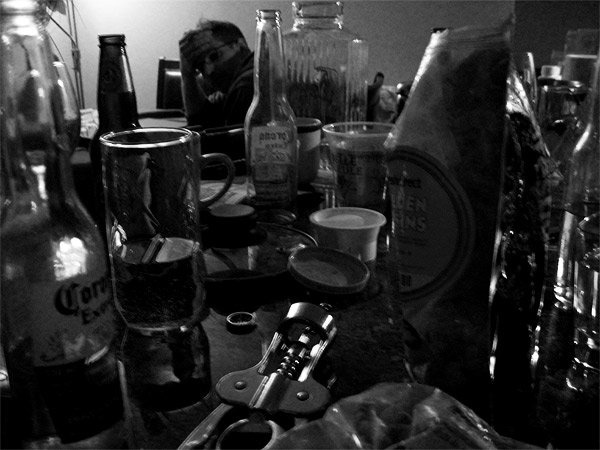
In discussion with Todd Burns on “Celebration Of The Lizard” by The Doors (1968).
This song has quite a special status in the Doors back catalogue, could you elaborate on why you choose this over other of their songs?
“Celebration Of The Lizard” does have a special status in the Doors back catalogue, largely because it was never released. The group ended their first two albums with very long, epic songs—“The End” and “When The Music’s Over”—and, as I understand it, this was supposed to be the song that concluded their third full-length. Unfortunately, for one reason or another, the group couldn’t get a take that they were happy with and had to substitute a few other tunes instead to fill out the record. As someone who is rather fascinated by the history of music, I’ve always been fascinated by failures and coulda-beens. “Death Of A Ladies Man” is my favorite Cohen album, I collected bootlegs of The Beach Boys’ “Smile” sessions but never listened to the one that Brian Wilson eventually released a few years ago. This song from The Doors is in that same vein.
There is plenty to choose from as far as rock history’s classic groups are concerned. What makes The Doors appealing to you?
I have a dark poetic past. And Jim Morrison’s poetry always appealed to a teenager that was prone to such flights of fancy. People often laugh at Morrison’s writing today, but I’d argue that he’s a much more interesting figure than what we have nowadays in popular rock music. Then again, I have my doubts that a group like The Doors would be on a label much bigger than something like Sub Pop in 2009. Also appealing to me was the music. It’s hard to overstate how strange and wonderful some of The Doors music sounded when placed alongside their contemporaries. Organ player, flamenco guitarist and jazz drummer and American Poet over top of all of it? And they even wrote some pop songs along the way? Yes, please. Read the rest of this entry »
Posted: December 28th, 2009 | Author: Finn | Filed under: Features | Tags: iamelectron, Interview, Primal Scream, Rewind, sounds-like-me.com | No Comments »
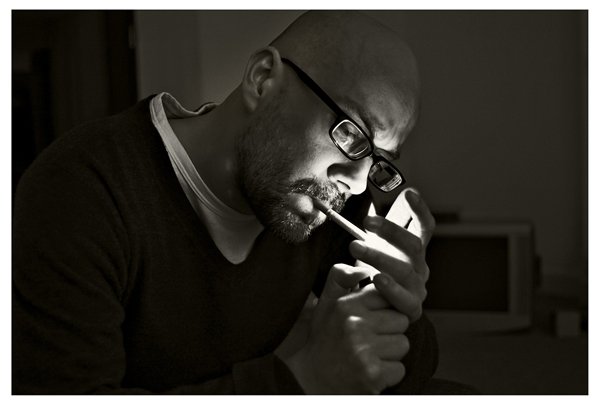
In discussion with iamelectron on “Don’t Fight It, Feel It” by Primal Scream (1991).
This single is an outtake of Primal Scream’s seminal “Screamadelica” album. What is so important to you about this track that you chose to discuss it, and not the whole album?
The album as a whole is an amazing creation (excuse the pun) but it’s “Don’t Fight It, Feel It” that means the most to me. Every time I hear it I’m back in 1991 and it still gets the hairs standing up. It’s one of those songs that I’ll never be able to disassociate from the state, time or place I was in when I heard it.
How do you have 1991 in mind, especially compared to the years shortly before and after? What made that year special?
The summer of 1991 was a major point in my life. It was when I decided to pack in Art College and give the DJ game a serious go. I’ve been around electronic dance music in one form or another for quite a while. I was, and still am a huge fan of New Order, and some friends and I started a Joy Division/New Order cover band at school called Funeral in Berlin. I had the bass and the pony tail so I was Hooky, haha! Then I got involved in a Goth Disco band. Don’t laugh! We covered Dead or Alive, Sylvester, The Fine Young Cannibals and our Hi-Nrg version of “Jolene” was legendary (to about five people). So I was really into the sound of drum machines and synths. But it wasn’t until I went to Edinburgh Art College in ’89 that house and techno really hit me. I stayed in halls of residence for my first year. In the room around the corner from me was this guy from Aberdeen and he was always with this girl from college that I had the major hots for but was too shy to approach. So one day I went up and introduced myself to him in the hope that he’d introduce me to said lovely lady. I never got the girl, but I did get introduced to Acid House. My new friend lent me copies of “The House Sound of Chicago” and the first Jackmaster compilation, and I was blown away by the rawness of it.
So I started hunting down more records. I’d done a few bits of DJ’ing before, playing at indie disco things with a few electronic tracks thrown in; Factory releases, Tackhead, Nitzer Ebb, early Ministry/Revolting Cocks, The Residents that sort of stuff – and now I was sticking in these new House tracks, completely unmixed I must add because I had no concept of how to put two records together at that point. I started to meet more people at college who were into the House scene and we’d head down to nights like UFO; a short lived weekly party in Edinburgh that Optimo’s JD Twitch ran before he created the infamous PURE night (with his DJ partner Brainstorm).
Then in 1990 Glasgow became the European City of Culture and with that came late licensing laws and Atlantis at the Sub Club (with residents Harri and Slam) so we’d head over there and got to catch the first touring DJ’s like the Boys Own and Flying gangs. Then a friend and I started driving down from Scotland to London to go to clubs there. I was being consumed by House! By now I’d completely lost interest in actually getting a degree and to my parent’s dismay I moved back home (home being St Andrews, a very small, very insular University town on the East Coast of Scotland) to ‘take a year out’. I’d unintentionally timed my move with the opening of a night in the nearby city of Dundee called the Rumba Club, and from the spring of 1991 to Christmas of that year it was absolute chaos! During those eight months Weatherall played three times – and on his second visit he dropped “Don’t Fight It, Feel It” as his very last song. I had never heard a reaction to a record like the one he received that night – and I don’t think I’ve heard a reaction like it since. When the whistle noise, stuttering percussion and that wobbly bass line started the place erupted – it was madness!!! I’d love to hear a recording of his set because I’m sure he was mixing both sides; starting with the A side and then moving onto the “Scat Mix”. When that deep, deep, bass noise he briefly uses in the track came on the place went up another gear. So I’m on a packed dance floor going nuts to “Don’t Fight It Feel It”, surrounded by all my friends who are going nuts and whack – epiphany time! Sod college, sod everything else…I want to do what he (Weatherall) is doing! So I left the club that night…“and he was never the same again”. Yip, 1991 and this track will always be really important to me. Read the rest of this entry »
Posted: December 21st, 2009 | Author: Finn | Filed under: Artikel | Tags: Ingo Scheel, Interview, Rewind, sounds-like-me.com, The Sex Pistols | No Comments »
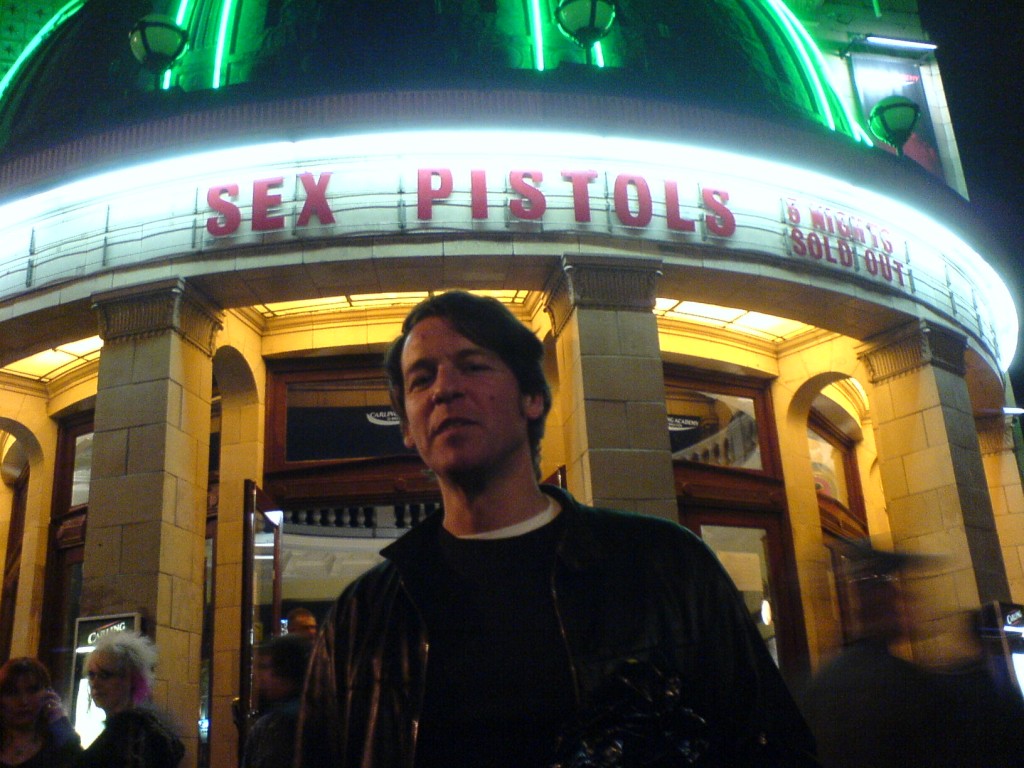
Im Gespräch mit Ingo Scheel über “Never Mind The Bollocks Here’s The Sex Pistols” von den Sex Pistols (1977).
Wann und wie war Deine erste Begegnung mit “Never Mind The Bollocks”?
Das war irgendwann im Herbst 1977, ich war 13. Mein bester Kumpel Assi und ich hatten von den Pistols gelesen, von Punk als Phänomen, das fanden wir alles super, aber es gab nirgendwo etwas zu hören. Bis dann Wolf-Dieter Stubel in der “Internationalen Hitparade” auf NDR2 “Holidays in the Sun” spielte. Ich weiß es noch genau, es war im Autoradio, mit meiner Mutter zusammen. Der Song beginnt, das Intro, Rottens Stimme, ich hätte ausrasten können. Die Welt sah sofort anders aus, der Song legte binnen Sekunden einen Schalter in meinem Leben um. Wieder zuhause angekommen rief ich Assi an, er hatte den Song auch gehört und wir konnten nicht fassen, wie gut die Pistols klingen. Zwei Monate nach dieser ersten Begegnung bekomme ich die Platte von Tante Renate zu Weihnachten. Es ist Bescherung, ich packe sie aus. Meine Tante sagt: “Na, nun möchte ich die aber auch mal hören.” Wir gehen in mein grün-weißes Jugendzimmer, ich werfe den orangefarbenen “Wifona Hitmaster” an (kein Scheiß), mach die Platte an. Während ich selbst die ganzen Songs zum ersten Mal und beinah implodiere, sitzt Tantchen auf der Bettkante, zieht an ihrer “Kim” (viel zu zart für Männerhände) und sagt: ” Das klingt ja alles gleich”. Ich sah das natürlich anders. Tantchen ließ mich dann zur Versöhnung an ihrer Zigarette ziehen und wir gingen wieder ins Wohnzimmer zurück. Später hab ich die Platte im Dunkeln noch mehrmals gehört und war zu aufgeregt, um einzuschlafen.
Wie würdest Du das Album beschreiben? Was macht es zu DEM Album für Dich?
Für mich ist es DIE eine Platte, die immer da war. Schlicht und ergreifend. Die Teenager-Jahre sind so prägend, wenn dir in dieser Zeit ein Album auf diese Weise den Kopf abschraubt – das wirst du nie wieder los. Stress in der Schule, nervende Eltern, Pickel, Mädels, der ganze Irrsinn, da waren die Sex Pistols ein erstklassiger Fixpunkt, mein klanggewordener, ausgestreckter Mittelfinger. Der britische Fußballer Stuart Pearce hat einmal gesagt, er hätte „Never Mind The Bollocks“ so oft gehört, es ist mittlerweile in seinen Genen. Das ist natürlich herrlicher Quatsch, aber ich für meinen Teil empfinde genauso. Read the rest of this entry »
Posted: December 14th, 2009 | Author: Finn | Filed under: Features | Tags: Greg Wilson, Interview, Rewind, sounds-like-me.com, The Temptations | No Comments »

In discussion with Greg Wilson on “Ball Of Confusion (That’s What The World Is Today)” by The Temptations (1970).
What is your personal history with this particular song and why did you choose it?
I suppose if I was put on the spot and asked to name my favourite all-time singles, this would be one of those that would immediately spring to mind.
My older brother and sister, like many teenagers growing up in the 60’s, regularly bought singles (7″ only in those days of course). They were both into Soul, with Tamla Motown, Stax and Atlantic releases making up the majority of what they owned. These singles gradually fell into my possession and became the foundation of my record collection.
This was one of those records, and the moment I heard it I was awestruck! From the count-in at the start, which I now know was the producer, Norman Whitfield, and the bass line intro, which I now know was a Funk Brother, Bob Babbit, it’s clear that you’re boarding an aural rollercoaster. And then the vocals come in, and what an opening salvo:
“People moving out, people moving in,
Why? Because of the color of their skin,
Run, run, run, but you sure can’t hide…”
We’ve barely started, yet the picture already painted leaves you in no doubt that we’re dealing in harsh realities here. The track is a snapshot of a point in time – with the 60’s moving into the 70’s it reflects the plight of black Americans, disillusioned by the slowness of change when it comes to their personal freedoms, whilst inhabiting a world that’s been changing at breakneck pace. As they try to make sense of the situation they find themselves in, things only become ever more bewildering, the title of the song perfectly capturing the mood of the moment.
Everything about this record is on a higher plane – the song, the vocals, the musicians, the production, it’s a whole crew of people right at the top of their game.
Having made such a strong impression on me, a white boy, I couldn’t begin to imagine how someone who was black would feel listening to this record. Years later I got my answer when interviewing Les Spaine, one of the DJs who inspired me back when I was starting out. This is what he told me:
“The Temptations were God. You waited religiously for any new Temptations record and I think we grew with them, you know. Afros were growing, political awareness was growing. Norman Whitfield, for me, timed it so well because I was reading Eldridge Cleaver, Huey P. Newton, Angela Davis, all those people. I wasn’t a militant, it was just, you know, people were frightened of certain things in America, but what they didn’t realise is that all of a sudden you got an understanding and, hang on, there’s some brothers and sisters here that can do a bit more than running and singing and boxing, which is not degrading. Not putting down any of those three things – that’s what we’re supposed to be good at. All of a sudden, here’s some academics here and the music evolved from just ‘scooby-dooby-do-wah-wah’ to like some of the stuff the Temps were singing. Whitfield got a bit long-winded with seventeen-and-a-half minute tracks with two minutes of vocals but, as a young man, I was really into all that underground…
To the majority of the black race, the Temptations were our Beatles. A new Temptations album came out, you bought it and then you listened to it. You didn’t go and sit in the box, because you used to have listening booths then, you just bought it. I always remember, it was really funny, I remember buying ‘Ball Of Confusion’ and I put it on and I left the arm off the machine so that it would go back to it and go back to it, and my dad, who was really one of the most laid back blokes I know, after about two-and-a-half hours of this, must have got fed up of hearing ‘and the band played on’ and just walked into my room, took it off, snapped it and walked off!”
Full interview here.
How did you experience the political, social and cultural climate the song reflects?
I was just a kid, aged 10 when this was released, fresh out of primary school, but, despite my obvious naïveté, tracks like this, along with others including Sam Cooke’s ‘A Change Is Gonna Come’, Marvin Gaye’s recording of ‘Abraham, Martin And John’, Edwin Starr’s ‘War’ (another Norman Whitfield / Barrett Strong composition, originally recorded by The Temptations, Starr’s version also produced by Whitfield) and even stuff like ‘Love Child’ by The Supremes and Clarence Carter’s ‘Patches’, really struck a chord with me at the time and got me thinking about deeper issues. This is a perfect illustration of the power of music to inform, although the main connection was on an emotional rather than an intellectual level – Soul music, even when the lyrics weren’t really saying anything poignant, could still affect me in a profound way.
I remember thinking ‘how can these people be treated so badly when they make such wonderful music’. I was certainly aware of the racist (or racialist as they said back then) attitude that black people were somehow lesser than whites – Enoch Powell’s infamous ‘Rivers Of Blood’ speech had taken place a few years earlier and I’d no doubt picked up on the race / immigration debate via the TV, newspapers and overhearing peoples’ conversations on the subject, it was certainly a hot potato of an issue back then.
Although I didn’t know any black people at the time, unlike many others of my age I fortunately wasn’t burdened with the ignorance and prejudice of the previous generation. I never heard any racist remarks from my family, to the contrary, my father was a big boxing fan and his hero was Mohammed Ali (going back to when he was still Cassius Clay), so my own first impression of a black man was totally positive.
I think it was my sister who explained racism to me, and the whole thing crystallized via these remarkable records, which connected with me on a deeper level than the music by white Pop artists (which I was also very much into) because I realized, at a very young age, that this Soul music was tied into a greater struggle. Read the rest of this entry »
Posted: December 7th, 2009 | Author: Finn | Filed under: Artikel | Tags: Burt Bacharach, Interview, Michael Kummermehr, Rewind, sounds-like-me.com | No Comments »

im Gespräch mit Michael Kummermehr über “Alfie” von Burt Bacharach (1966).
Kannst Du Dich noch daran erinnern, wann Du das erste Mal bewusst Burt Bacharach gehört hast?
Ja, ich glaube das müsste im öffentlich-rechtlichen Fernsehen vor der Kabelfernsehzeit gewesen sein. Als ich ein Kind war, Mitte/Ende der 70er, lief „Butch Cassidy And The Sundance Kid“ mit Robert Redford und Paul Newman. Einer der Westernklassiker, den man aber als Kind komisch findet, weil die Cowboys auch Fahrrad fahren und oft verliebt sind. Besonders “Raindrops Keep Fallin’ On My Head”, von Billy Joe Thomas gesungen, ist einer der Radiohits, die man schon als Sechsjähriger im Ohr hat, was einen aber noch nicht zum erklärten Bacharach-Fan macht. Allein deshalb, weil man in dem Alter glaubt, dass der Sänger seine Lieder da im Radio selber macht. Ich denke, wer Burt Bacharach ist, habe ich im Ansatz erst in den frühen 90ern verstanden. In der Spex gab eine Rubrik namens „Legendäre Typen“ (die Spex war damals noch ein reines Herzblutprodukt und heute vergleichbar mit einem gut gemachten Blog, also in Themenauswahl und Meinungsmachertum sehr subjektiv, sehr unberechenbar, oft gewagt und fast ebenso oft gewinnend charmant). Diese Reihe handelte von einflussreichen Über-Kreativen wie Arthur Baker, Tony Wilson und… Burt Bacharach – Ein Hugh Hefner mit Steinway Flügel. Das war ungefähr zu der Zeit als, die Interpretationen von „Look Of Love“ von Wild Bunch und „Say a Little Prayer“ von Bomb The Bass herauskamen.
Übrigens: Wenn man alte Tapes von Soul II Soul oder Wild Bunch Warehouse Parties der späten 80er und frühen 90er hört, ist man erstaunt, dass da 60ies-Instrumentals von Schifrin, so wie den Ventures oder Shadows liefen. Der Name Bacharach fiel mir auch immer auf, wenn wir auf der A61 von Ludwigshafen nach Köln gefahren sind: Dann passierte man die Autobahnausfahrt Bacharach. Ein Städtchen am Rhein im Kreis Mainz Bingen. Bestimmt süß und gutes Essen gibt es da sicher auch. Ich war noch nie da.
Bacharach hat unzählige Klassiker geschrieben. Warum hast Du Dich für “Alfie” entschieden? Was macht den Song so speziell für Dich?
Haha! Frage 2 und schon kommt die rhetorische Frage. Meine Frau und ich haben uns den – jedenfalls kommt es meinen Eltern so vor – bourgeois-exzentrischen Luxus erlaubt, unseren Sohn Alfie zu nennen, ohne Zweitnamen und andere Tricks. Im Standesamt in Pankow, wo ich die Geburtsurkunde abgeholt habe, war deswegen auch echt “High Life”. Die Bediensteten fanden Vor- und Nachnamen einfach oberniedlich. Die Damen um die 50 hatten Tränen der Rührung in den Augen, bevor es Schlag 11.30 in die Mittagspause ging. Meine Frau Andrea kam auf die Idee, Alfie, Alfie zu nennen. Sie fand das Lied schön und wollte einen englischen Namen, den man im Deutschen so aussprechen kann, wie man ihn liest. Weil wir eine Erinnerung an unsere schöne Zeit in London haben wollten und weil unser Kind auf keinen Fall einen dieser Kollwitzplatz-Namen bekommen sollte, Luca oder wie die alle heißen. – Ich meine, Luca oder Leon sind absolut süße Namen, auch diese bildungsbürgerlichen altdeutschen Namen sind spitze, aber deren Individualisierungstauglichkeit geht vor unserer Haustür leider gegen Null.-
Ich muss noch immer an diese Vorlesung in Rechtsphilosophie denken, in der Professor Pawlowski den Hegelschen Weltgeist erklärt hat. Er meinte (das ist 17 Jahre her), dass in zehn Jahren Namen en vogue seien werden, die wir heute (also damals) als unpassend empfinden, und dass dann die zukünftige (also die heutige) Mehrheit, diese Namen als sehr schön und würdig für die eigenen Kinder empfinden würde. Dass also die Mehrheit bzw. die Welt durchdrungen von dem Geist sei, ihren Kindern solche Namen zu geben. Das sei mehr als Gruppenzwang und mehr als Mode. Ich fand es ein bisschen unheimlich. OK…zurück zur Frage. Wir fanden das Lied so gut, dass wir uns gegen den herrschenden Weltgeist gestemmt haben. Read the rest of this entry »
Posted: November 30th, 2009 | Author: Finn | Filed under: Artikel | Tags: Franz Josef Degenhardt, Interview, Jan Joswig, Rewind, sounds-like-me.com | No Comments »

Im Gespräch mit Jan Joswig über “Umleitung” von Franz Josef Degenhardt (1966).
Wie und wann bist Du auf “Umleitung” bzw. überhaupt auf Franz Josef Degenhardt gestoßen?
Mein Schulfreund und ich dachten es wäre als Korrektiv zu unseren unverschämt blonden Surferhaaren wichtig, wenn wir uns als nachdenkliche Humanisten inszenierten statt als draufgängerische Hedonisten. Während die anderen Haschpfeifen am Gürtel trugen, schleppten wir eine Wandergitarre mit uns rum und hörten Georg Danzer, Konstantin Wecker, Bettina Wegner und Franz Josef Degenhardt. Fast wären wir in die Jugendpolitik gegangen. Ehrlich gesagt, bin ich’s sogar. Ich war Gründungsmitglied des „Grün Alternativen Jugendverbandes“. Aber es war nur wegen der Prinz-Eisenherz-Comics von Hal Foster, die der Kassenwart sammelte. Ich schwör’s beim Singenden Schwert!
Was macht “Umleitung” so wichtig für Dich?
„Umleitung“ ist der Freud’sche Versprecher in Degenhardts Werk, das Stück, das geheime Identitäts-Vorstellungen von ihm verrät: einmal der Star mit Pflaumenhintern-Groupie sein statt immer der Oberlehrer-Entertainer mit Faltenrock-Tanten am Rollkragenzipfel. Ich bilde mir ein, diesen Einblick hat er nur halb bewusst inszeniert. So viel unkontrollierte Sehnsucht und Frustration blitzt sonst nie im Liedermacher-Genre auf. Ferien vom eigenen (politisch-künstlerischen) Ich nehmen und sich endlich „ruhig mal reaktionär sein“ lassen. Als „miesen Chauvi“ haben wir ihn in unseren Wandergitarre-Zeiten dafür geächtet (erinnert sich heute auch keine Sau mehr dran, an dieses Schimpfwort). Read the rest of this entry »
Posted: November 23rd, 2009 | Author: Finn | Filed under: Artikel | Tags: Interview, Prefab Sprout, Rewind, sounds-like-me.com, Tobias Rapp | No Comments »

Im Gespräch mit Tobias Rapp über “Andromeda Heights” von Prefab Sprout (1997).
Wie und wann war Deine erste Begegnung mit Prefab Sprout?
Erstaunlich spät. Tatsächlich war “Andromeda Heights” die Platte, mit der ich Prefab Sprout entdeckt habe. Im Grunde fiel sie mir aus dem Himmel, in dem sie spielt, vor die Füße. Ich hatte ganz viel verschiedene Musik in den Neunzigern gehört: Techno, Hiphop, Jazz, Sixties-Pop, alles mögliche, aber nur sehr selten Musik, die von einem so emphatischen Popbegriff lebt, wie Prefab Sprout das tun. Die wollen ja beides: Pop als Zeichensystem benutzen, also in so einem Pop-Referenz-Universum leben, und selbst Pop sein, also mit der großen Geste spielen, “we were quoted out of context, it was great”, wie es in “Electric Guitars“ so schön heißt.
Meine damalige Freundin hat mich auf Prefab Sprout gebracht – und Thomas Groß, der damals Popredakteur der taz war und über die Platte geschrieben hat. Einen schönen Text, in dem er die Platte als große Geste der Modernisierungsverweigerung beschreibt. Das mag sich damals so angehört haben, neben Drum’n’Bass und Tricky. Von heute aus ist die Platte ja ganz eigenartig zeitlos, finde ich.
Von “Andromeda Heights” aus habe ich mir dann die anderen Dinge nach und nach auch angehört. Natürlich ist mir in den Achtzigern “Cars and Girls” auch schon mal untergekommen, wobei mir damals natürlich entging, dass es ein Answer-Song auf auf “Down By The River” von Bruce Springsteen ist. Ich dachte, irgendwie sei das ein Stück über Autos und Mädchen. Ein super Missverständnis und ganz im Sinne von Prefab Sprout, würde ich vermuten, weil ich das einfach als Popsong gehört habe, er also auch ohne den Meta-Pop-AnteiI funktioniert hat. Doch richtig tiefen Eindruck hat er nicht hinterlassen. Das fing erst mit “Andromeda Heights” an.
Warum hast Du Dir “Andromeda Heights” ausgesucht?
Weil es meine Lieblingsplatte ist. Im Sinne von: eine der ganz wenigen Platten, die ich immer wieder hören kann. Read the rest of this entry »
Posted: November 16th, 2009 | Author: Finn | Filed under: Features | Tags: Interview, Jeffrey Sfire, Patrick Cowley, Rewind, sounds-like-me.com | No Comments »
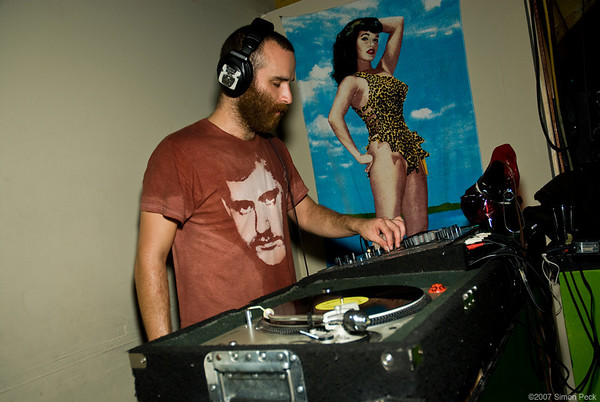
In discussion with Jeffrey Sfire on “Mind Warp” by Patrick Cowley (1982).
What was your first encounter with “Mind Warp”?
I was living in Chicago going to university and I found “Menergy” in a store and thought “obviously this is for me”. After that I found “Mind Warp”. Instantly there was a connection. I started reading about Patrick and fantasizing about gay disco life in San Francisco. I think every gay kid from my generation is obsessed with a 70’s gay fantasy. I had been hanging out in leather bars and got a tour of a closed bathhouse/disco still preserved from the 80’s. It was all perfect timing.
Why did you choose this particular album from the works of Patrick Cowley? Are there personal favourites among the songs or do you like it in its entirety?
I love it all. It’s great start to finish. It’s pretty serious and much darker which I always seem to gravitate towards. It was the first album of his I listened to which is kind of backwards because it’s his last but it always stuck out even after hearing everything else. The more I listened to it the more I saw and heard. Singing about technology (“Tech-no-logical world”) in 1981 was so interesting to me, and we’re still singing about it now 30 years later! If he only knew. Of course “Mind Warp” the song is a favorite, and the delay on that one synth in “They Came at Night” is amazing! “Goin’ Home” always intrigued me for some reason. I’d later learnt what it was really about. Read the rest of this entry »
Posted: November 9th, 2009 | Author: Finn | Filed under: Features | Tags: Interview, Rewind, sounds-like-me.com, Surgeon, The Art Of Noise | No Comments »
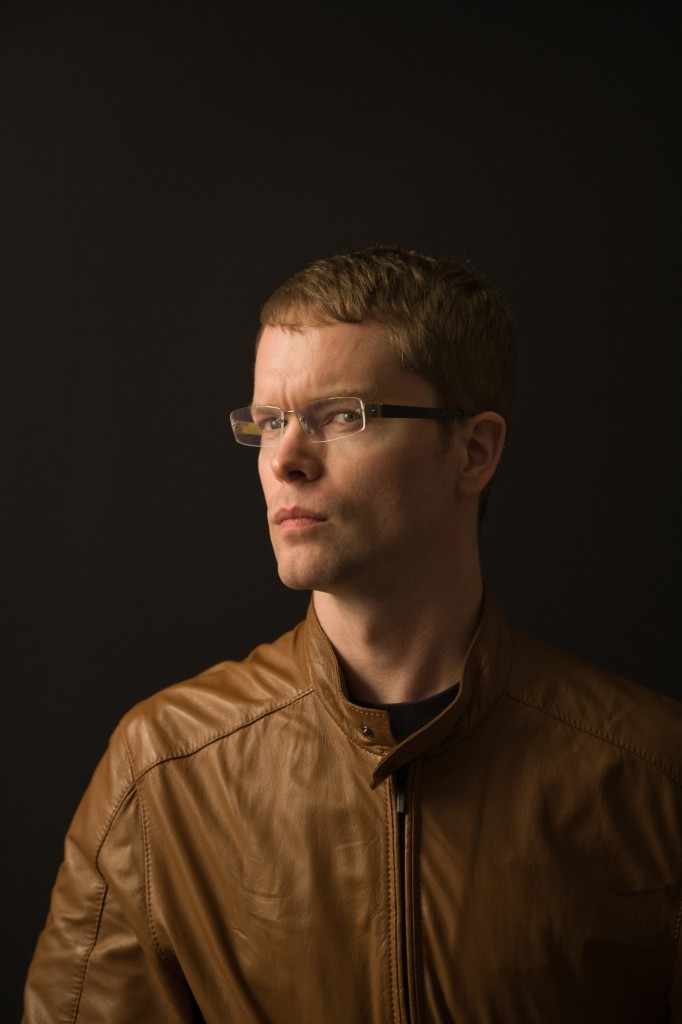
In discussion with Surgeon on (Who’s Afraid Of?) The Art Of Noise! by The Art Of Noise (1984).
How did you first encounter The Art Of Noise?
Difficult to remember as it was so long ago, perhaps it was seeing them perform “Close to (the Edit)” on Top of the Pops wearing those masks. That was in 1984.
What made you decide for this album? Why is it so important to you?
For me it’s a forgotten gem in the history of English electronic music. I fondly remember listening to it again and again. Read the rest of this entry »










Recent Comments